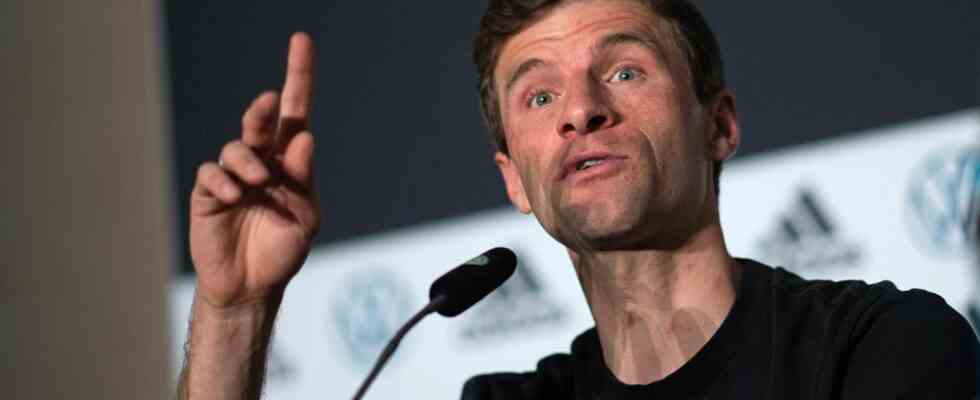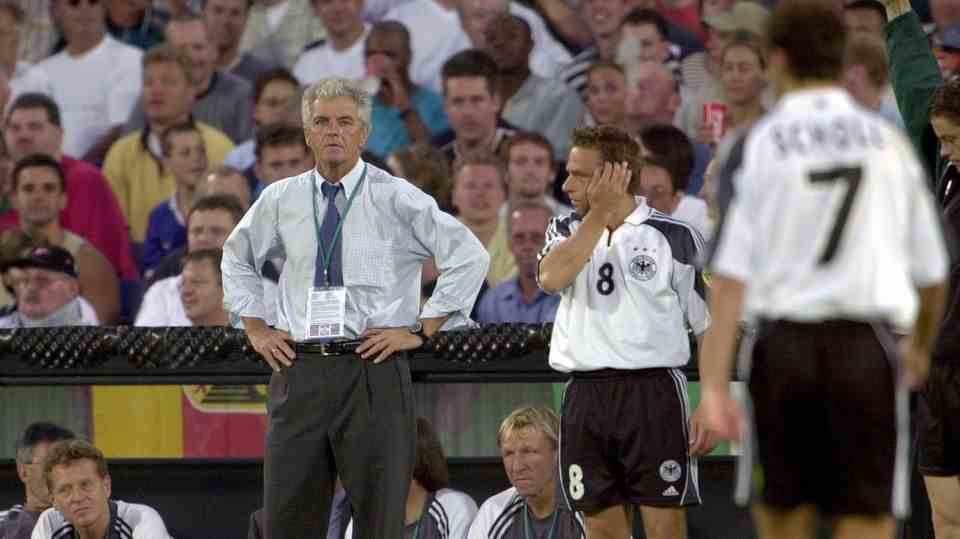opinion
World Cup in Qatar
Thomas Müller comments on human rights – but this time he should have been silent
Talked head and neck at the DFB press conference: National player Thomas Müller
© Sebastian Gollnow/ / Picture Alliance
Thomas Müller is known for his open words. However, when he was asked about human rights in Qatar at the DFB press conference on Wednesday, the national striker lapsed into dubious tirade.
Everything could have been so nice in football in Germany: the start of the international year with duels against Israel and the eternal rivals Netherlands, an ever better atmosphere in the DFB team after Hansi Flick was taken over and the resulting more attractive football and a national coach who is clearly positioned on the role of Qatar and FIFA in the stern interview and questioned the awarding processes for sporting events.
But then came the press conference on Wednesday with Thomas Müller, who completely tore down the atmosphere within two minutes. DFB director Oliver Bierhoff invited representatives of human rights organizations to give players and officials an insight into human rights violations and working conditions in Qatar and around the world on Tuesday evening. So at the DFB – and that’s positive – a change in thinking can be seen. “It is our goal that we deal with the topic,” explained Bierhoff in advance of the team-internal event. However, that seems to have backfired. “Broadly speaking, it’s about human rights violations that occur in basically every country. There are also human rights violations in Germany,” Müller stammered into the microphone after a question from a journalist at the daily press conference. Bierhoff announced further meetings of this kind on Tuesday, but according to Müller’s first statement, they cannot do any harm.
Thomas Müller’s statements are a mockery of human rights organizations
It seems to have reached Müller and the DFB that there are human rights violations in Qatar. That was different a few years ago, when football icon Franz Beckenbauer philosophized about the fact that he hadn’t seen a single slave in Qatar and that everyone was allowed to roam freely there. However, equating human rights violations in Qatar and Germany is an argument that is as feeble as it is pointless.
After Research by ZDF 15,000 people lost their lives just during the construction of the World Cup stadiums. Almost all of them are migrant workers, as around 2.5 million of the country’s 2.8 million inhabitants are immigrants. As recently as November, Amnesty International underwent the Working conditions in Qatar a reality check. Among other things, there were complaints that there is hardly any opportunity to change jobs in the kafala system, wages are not paid, workers have more difficult access to justice or the establishment of trade unions is prevented – the list of misconduct in the host country is long . Although the Qatari government passed laws intended to benefit the workers, according to Amnesty International there is still a problem with their implementation – something that the human rights experts may have told the DFB team on Tuesday evening, because Amnesty International was one of the organizations that invited was. Müller’s statement that “there was nothing new about it, but it was objectified” comes across as a mockery of the organizations’ work. If Müller already knew about the human rights violations, why didn’t he speak up sooner? Although it probably wouldn’t have been much better than the statement on Wednesday.
Müller sees associations as responsible
But that’s not all, because Müller started to make another extravagant statement in which he talked about his head and neck. In countries with a different culture, especially around Qatar, there are different views on “some things that we now consider normal, such as women’s rights or labor rights, we have a different legal basis or implement it differently.” Thomas likes history Müller are not wrong, women’s rights and labor rights did not always exist in Germany either, the road to get there was long, hard and rocky and is still far from over when it comes to women’s rights. But seeing this as the norm is like it’s perfectly fine for professional footballers to earn €15m a year – but football salaries are a different matter. The fact that the DFB was not really happy about the statements can be seen in the highlight video of the press conference: Müller’s statements about Qatar were completely cut out there, are in the Original clip on the DFB website but still available.
For the development in Qatar, however, Müller immediately put the task on the associations and Fifa – the latter now not necessarily having a greater interest in human rights in Qatar should actually have been well known since the award in 2010. “We try to go through life with open eyes, but for the tournament we try to put the sport first. But we hope that through the work of the association, from the DFB, the organizer and FIFA, we might be able to set bigger levers in motion,” enthused Müller. It is understandable that as an athlete you want to achieve the best possible. Athletes such as Erik Lesser and Mariama Jamanka, who repeatedly drew attention to human rights violations in China and misconduct by the IOC before and during the Winter Games in Beijing, have shown that sporting success can also be combined with a clear attitude. “There are things that are not necessarily part of our expertise as athletes,” Müller began in response to the journalist’s question. It would have been better if he had kept quiet afterwards.


